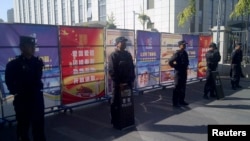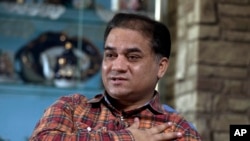A prominent Chinese academic who is critical of Beijing's treatment of the Uighur ethnic minority group has rejected the charges and evidence against him at the opening of his separatism trial.
Lawyers for Ilham Tohti, an economics professor and outspoken member of the mainly Muslim group that has long complained of persecution in the far-western Xinjiang region, told reporters after the hearing Wednesday that the testimony against their client was not trustworthy.
Speaking from the Xinjiang capital of Urumqi, where the trial is being held, lawyer Li Fangping said the evidence presented by the prosecution was inadequate.
Tohti, who has denied the separatism charges against him, faces a possible sentence of life in prison if, as expected, he is convicted. It is not clear when the trial will conclude.
Police set up a multi-block perimeter around the courthouse, blocking access for journalists and Western diplomats who tried to attend the hearing.
Diplomats barred from attending
Raphael Droszewski with the Delegation of the European Union in Beijing was among those barred from attending the hearing.
"We are here today because we would like to attend the trial of Ilham Tohti. We have already expressed our concern over his indictment, especially because Mr. Tohti worked peacefully within Chinese laws for years, especially to promote a good relationship between minorities in China and for equal rights," said Droszewski.
A U.S. Embassy spokesman says Tohti’s “arrest silenced an important Uighur voice that peacefully promoted harmony and understanding among China’s ethnic groups, particularly Uighurs.” The spokesman said the United States has stressed to Chinese authorities the importance of differentiating between peaceful dissent and violent extremism.
Ambassador Max Baucus is also in Xinjiang this week, leading a trade delegation to the region on a previously scheduled trip. While there, he will meet with Xinjiang officials.
Charges against Tohti
Tohti was arrested in January and later accused of encouraging terrorism and advocating separatism in his lectures, articles, and comments to foreign media.
His lawyers deny Tohti has ever encouraged violence and point out that he has repeatedly rejected calls for separatism or independence in Xinjiang.
The charges against Tohti come amid China's crackdown on violent extremism in Xinjiang, where hundreds have died in about the past year.
Beijing blames the unrest on militants affiliated with the East Turkestan Islamic Movement, which wants to create an independent state in Xinjiang.
Many exiled Uighur groups say Beijing has exaggerated the threat and worsened the situation with its repression of Muslim religious life and favoritism toward the Han majority who have migrated to the area.
Tohti has for decades written about China's treatment of Uighurs and has been detained or harassed several times in the past because of his views.
In November, before his arrest, Tohti told VOA that plain-clothes police rammed his car, took his phone, and threatened to kill him because of his comments to the media.
His lawyers claim Tohti has also been subject to abuse while in detention, saying his feet have been shackled and that he has been kept from food for long periods of time.
At a hearing in Washington D.C. earlier this year, hosted by the Congressional Executive Commission on China, his daughter testified Chinese authorities' have persecuted her family.
“Anyone who knows my father, realizes how bold these charges are," Tohti’s daughter Jewher Ilham, who is studying in the United States at Indiana University, told the audience. "My father never speaks about separatism. By arresting my father, China has driven Uighurs to understand that their justified grievances can not get any sort of hearing.”
Tohti has long questioned the government’s official narrative when it comes to violent attacks that authorities brand as acts of terrorism. He has consistently argued that more transparency and facts are needed to understand the motives behind the attacks China is facing.
William Gallo contributed to this report from Washington.













